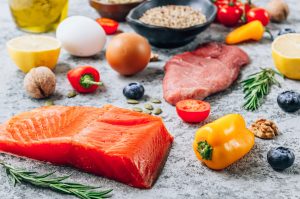
That doesn’t mean that you’re totally out in the cold. However, certain lifestyle behaviors may help reduce symptoms and help you cope with your condition.
Ulcerative colitis is the result of inflammation in the rectum and colon. It has no medical cure, and it can flare up and cause significant disruptions and pain. Some of the symptoms include diarrhea, abdominal pain and cramping, an urgency to defecate, and more.
One of the best ways to manage symptoms is diet.
There is no specific way of eating to offer the best defense from the condition. In fact, there are no studies that show any specific diets or foods cause flare-ups. The best approach is likely to learn which foods aggravate your system and avoid them.
Eating a well-balanced, healthful diet that is rich in fruit and vegetables, like the Mediterranean diet, may help. Processed foods, particularly those with emulsifiers and preservatives, are a good idea to limit or avoid.
A low-FODMAP diet may also be helpful in managing symptoms. FODMAP stands for the short-chain carbohydrates known as fermented oligosaccharides, disaccharides, monosaccharides, and polyols.
Some people who eat high-FODMAP foods have a higher likelihood of problems like diarrhea, bloating, abdominal pain, and flatulence.
Here are some examples of FODMAPs:
- Disaccharides: Lactose in milk and other dairy products
- Monosaccharides: Fructose in apples and honey, for example.
- Oligosaccharides: Fructans in wheat, onions, garlic, and galactans in beans, lentils, and soybeans.
- Polyols: Sorbitol and mannitol are found in some fruits, vegetables, and artificial sweeteners.
Curbing ulcerative colitis symptoms will take some effort, work, and patience to figure out your individual triggers. Speaking with your doctor and a registered nutritionist is recommended to help you navigate the challenge.